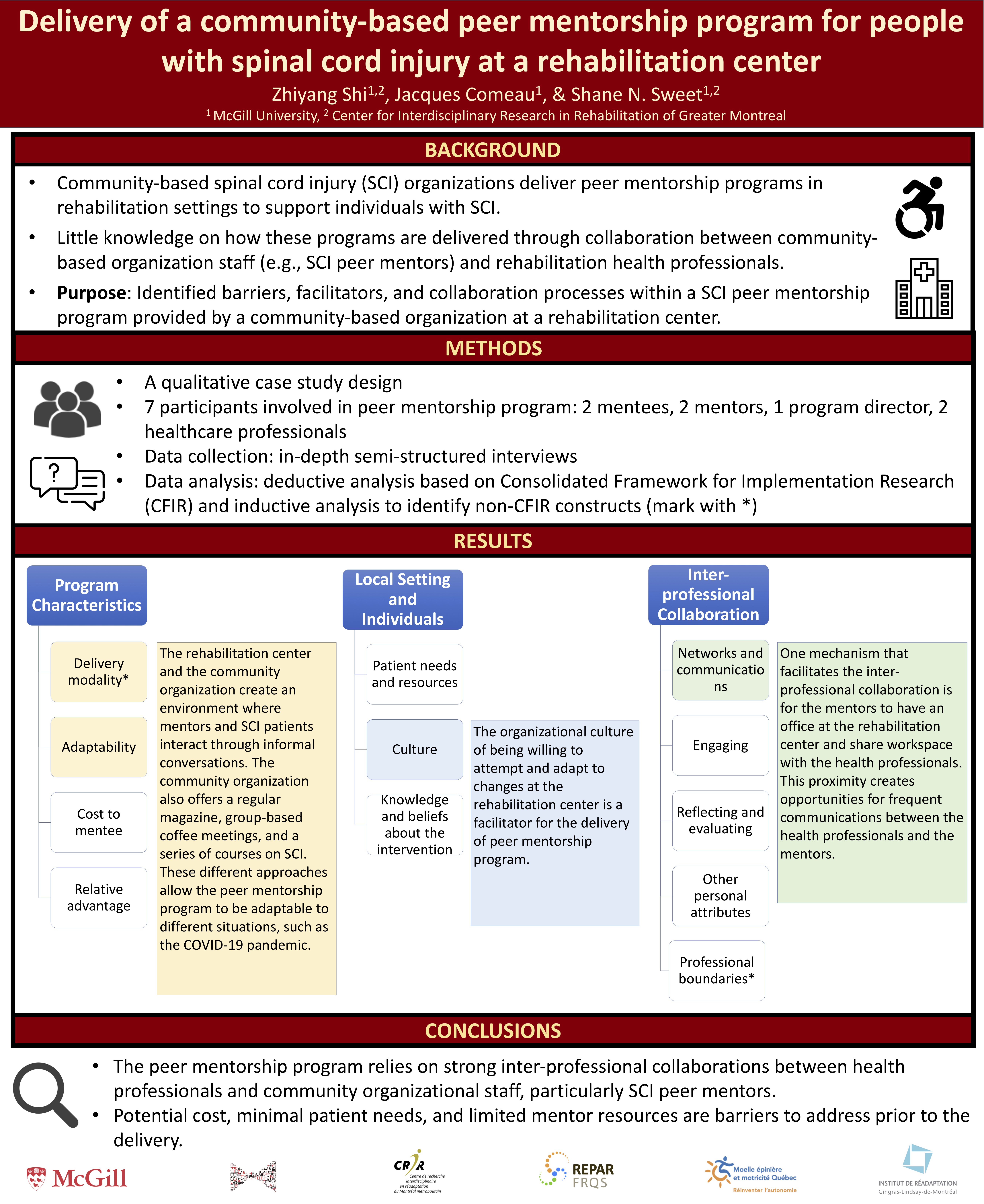Exploring how Chinese adults living with spinal cord injury viewed the prospect of inpatient peer support programs within a hospital-based rehabilitation setting
This study identified the need and preference for a peer support program to be implemented at a rehabilitation hospital in China. Multiple ways to develop and implement the program were suggested by the Chinese inpatients with SCI.
Implications
-
We identified an unmet need for peer support and suggestd that Chinese adults with SCI need to obtain practical information, emotional support, and motivation from peers.
-
Chinese rehabilitation hospitals should first consider encouraging and promoting informal interactions (e.g., WeChat groups) among inpatients with SCI as a starting point to develop peer support programs.
-
Peer mentorship programs in Chinese rehabilitation hospitals may also require linking peer mentors with health profes- sionals to help build a trusting relationship between mentors and mentees, as participants reported high levels of trust in health professionals
Abstract
Study design: Generic qualitative design.
Objectives: To explore how Chinese adults living with spinal cord injury (SCI) viewed the prospect of inpatient peer support programs within a rehabilitation setting.
Setting: Hospital in China.
Methods: A purposive sample of adult inpatients with SCI (N = 6) currently undergoing rehabilitation was recruited. Each participant was interviewed twice. Twelve interview transcripts were analyzed using a thematic method.
Results: Five higher-order themes were developed. First, participants had unique backgrounds and personal lives before and after their SCI and reported frustrations about their lives resulting from their SCI. Second, participants reported varying degrees of satisfaction with their rehabilitation and identified the facilitators and barriers to their rehabilitation. Third, their perspectives on peer support were shaped by their rehabilitation goals. For example, participants who solely focused on the recovery of physical functioning noted that peers could help to supplement existing rehabilitation programming by guiding their rehabilitation exercises. Participants who concentrated on their future lives believed peers could teach them new skills to facilitate their integration in the community. However, some participants felt they could not trust peers’ advice because peers are not healthcare providers. Fourth, peer support delivery options varied from online chat groups (i.e., WeChat), in-person conversations, and mentoring lectures. Finally, anticipated outcomes were related to obtaining practical and emotional support from peers, being motivated, and feeling understood.
Conclusions: Participants harbored mixed views on potential use-value and necessity of hospital-based peer support programs, which could inform future utilization of SCI peer support within Chinese hospitals.
Infographics and Posters

Project Information and Citation
Project lead and contact information: Zhiyang Shi, zhiyang.shi [at] mail.mcgill.ca.
Citation: Shi, Z., Koch, J., Schaefer, L. et al. Exploring how Chinese adults living with spinal cord injury viewed the prospect of inpatient peer support programs within a hospital-based rehabilitation setting. Spinal Cord 58, 1206–1215 (2020). https://doi.org/10.1038/s41393-020-0490-y
Delivery of a community-based peer mentorship program for people with spinal cord injury at a rehabilitation center
Our team investigated the delivery of an ongoing SCI peer mentorship delivered by a provincial community organization at a Quebec rehabilitation hospital. We also focused on understanding how the local health professionals collaborate with the SCI peer mentors to deliver the program.
Implications
-
The successful delivery of the peer mentorship program relies on the interprofessional collaboration between the local health professionals and the SCI peer mentors.
-
One unique characteristic of the program is the creation of "proximity" between the local health professionals and the SCI peer mentors. These individuals share a common workspace and have regular formal and informal communication at the rehabilitation hospital.
-
Explicit professional boundaries need to be drawn between health professionals and SCI peer mentors to make sure these individuals can fulfill their roles and responsibilities.
Abstract
Introduction: Community-based spinal cord injury (SCI) organizations deliver peer mentorship programs in rehabilitation settings. Little is known on how these programs are delivered through the collaboration between community-based SCI organizations and rehabilitation institutions. This study aimed to identify barriers, facilitators, and collaboration processes within a SCI peer mentorship program provided by a community-based organization at a rehabilitation center.
Methods: A qualitative case study design was applied. Seven participants were recruited, including two mentees, two mentors, one program director of the community-based SCI organization, and two healthcare professionals of the rehabilitation center. Each participant completed a one-on-one interview. Data were analyzed inductively and deductively based on the Consolidated Framework for Implementation Research (CFIR).
Results: Ten factors were identified to influence the delivery of the peer mentorship program, including nine CFIR constructs. Successful delivery of the program required strong, collaborative inter-professional relationships between health professionals and community organizational staff (e.g., peer mentors) as facilitators; whereas potential cost, minimal patient needs, and limited mentor resources were found to be barriers. Engaging health professionals by initiating communications, reflecting and evaluating the program collectively with health professionals were important collaboration processes for the community-based organization to maintain effective partnership with the rehabilitation center.
Discussion: The collaboration processes and strategies to addressing/leveraging the barriers and facilitators may inform evidence-based practice to establish and optimize the delivery of SCI peer mentorship programs in various rehabilitation settings.
Infographics and Posters

Project Information and Citation
Project lead and contact information: Zhiyang Shi, zhiyang.shi [at] mail.mcgill.ca.
Citation: Shi Z, Comeau J, Bloom GA, Gainforth H, Thomas A and Sweet SN (2023) Delivery of a community-based peer mentorship program for people with spinal cord injury at a rehabilitation center. Front. Rehabil. Sci. 4:1296505. doi: 10.3389/fresc.2023.1296505

